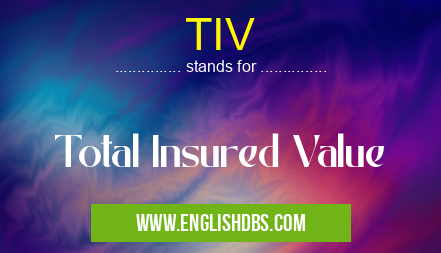What does TIV mean in GENERAL
TIV, or Total Insured Value, is a term used in the insurance industry to describe the total monetary value of all the benefits and coverage offered by a particular insurance policy. In other words, it represents the maximum amount that an insured party can receive from their insurer if they experience a covered event. TIV can also include any additional premiums or deductibles that may be associated with certain types of coverage. By understanding TIV, policyholders are better equipped to make informed decisions about their insurance policies and determine how much protection they need for their assets.

TIV meaning in General in Business
TIV mostly used in an acronym General in Category Business that means Total Insured Value
Shorthand: TIV,
Full Form: Total Insured Value
For more information of "Total Insured Value", see the section below.
What is TIV
Total Insured Value (TIV) refers to the total amount of money listed on an insurance policy as being available for payouts should something occur that would require it. This includes both coverage limits and deductibles associated with each type of coverage. For example, if an individual has auto insurance with a TIV of $100,000, this means that in the event of an accident, they are guaranteed up to $100,000 worth of financial support from their insurer. This specific term is important to consider when purchasing or renewing an insurance policy since it helps individuals understand how much protection they have against potential risks and losses in the future. Knowing one's TIV can help policyholders determine whether or not their existing coverage levels are adequate for their needs, or if they need to adjust them higher or lower depending on what kind of protection is desired or available.
Essential Questions and Answers on Total Insured Value in "BUSINESS»GENERALBUS"
What is Total Insured Value (TIV)?
Total Insured Value (TIV) is an insurance measure, indicating the maximum amount of coverage provided per policy. The TIV total is determined by the sum of all the independent values that are associated with a policy, such as property rebuild costs, furniture and fixtures, past investments, etc.
How can I calculate my TIV?
The best way to determine your TIV is to consult an insurance broker or an insurance specialist who understands the relevant policies for your market and goal. They can help you evaluate all aspects of your policy and advise you on a suitable amount for your TIV.
Does the TIV increase or decrease over time?
Generally speaking, the TIV should increase over time as new items are added to a policy and existing items grow in value due to inflation or other factors. To ensure that your TIV keeps up with market changes, it's important to adjust your coverage regularly.
Does my TIV have an expiration date?
Policies have different expiration dates depending on their terms and conditions. It's important to stay informed about any changes in these dates so you can renew them on time. Your insurance provider should also be able to provide guidelines on what happens if you fail to renew before expiry date.
Should I take out additional coverage if my TIV has not been updated?
If your current coverage is insufficient given the current market value of insured items, it is always recommended to purchase additional protection in order to cover any unforeseen risks or losses that might occur during the course of your policy period.
Can I add or subtract from my existing TIV?
Yes, within limits set out by each individual policy. Generally speaking, most policies will allow for some flexibility when it comes to increasing or decreasing the overall limit of coverage for a particular item or group of items. This can be useful for streamlining costs or ensuring better protection against various risks and threats during a given period.
What kinds of things could affect my TIV negatively?
Depending on your type of coverage and insurer's terms and conditions, certain events could lead to a decrease in your total insured value — such as if there were any kind of theft related incident(s) resulting in material losses (especially those with higher market values). Additionally, unexpected natural disasters which cause significant damage may result in reduced sums being paid out upon claim submission(s).
How can I review my current TIV?
Reviewing you're existing Total Insured Value is relatively straightforward; all you need do is consult with an experienced financial consultant who specializes in insurance policies affecting particular markets or areas where you're looking at investing into - they will be able guide/advise accordingly after proper evaluation/assessment has taken place.
Final Words:
Total Insured Value (TIV) is an important concept for anyone who owns an insurance policy to familiarize themselves with. Understanding one's TIV can help them make informed decisions about what kind of coverage levels and options are best suited for their situation. It gives individuals certainty about how much protection their insurers will provide should anything happen that calls for such financial support. With knowledge and understanding around what Total Insured Value is and how it works when selecting and maintaining an accurate level of coverage, individuals can rest assured that they have adequate protection against potential losses in life.
